IFP Reflective Essay: Enhancing Grammar and Vocabulary Proficiency.
VerifiedAdded on 2023/06/11
|6
|1817
|214
Essay
AI Summary
This essay reflects on the author's journey of improving grammar and vocabulary skills through the International Foundation Programme (IFP). It highlights specific challenges faced with phrasal verbs, Latin verbs, and collocations, providing examples from appendices showcasing areas of improvement. The essay details learning techniques employed, such as studying grammar books, practicing exercises, and utilizing guidelines provided by the IFP. The author acknowledges progress made in academic writing due to the program, while also recognizing the need for continued practice to further enhance grammar and vocabulary proficiency. The reflection emphasizes the importance of consistent effort and the benefits of the IFP in building a solid foundation for future academic endeavors. Desklib provides access to similar essays and study resources for students.
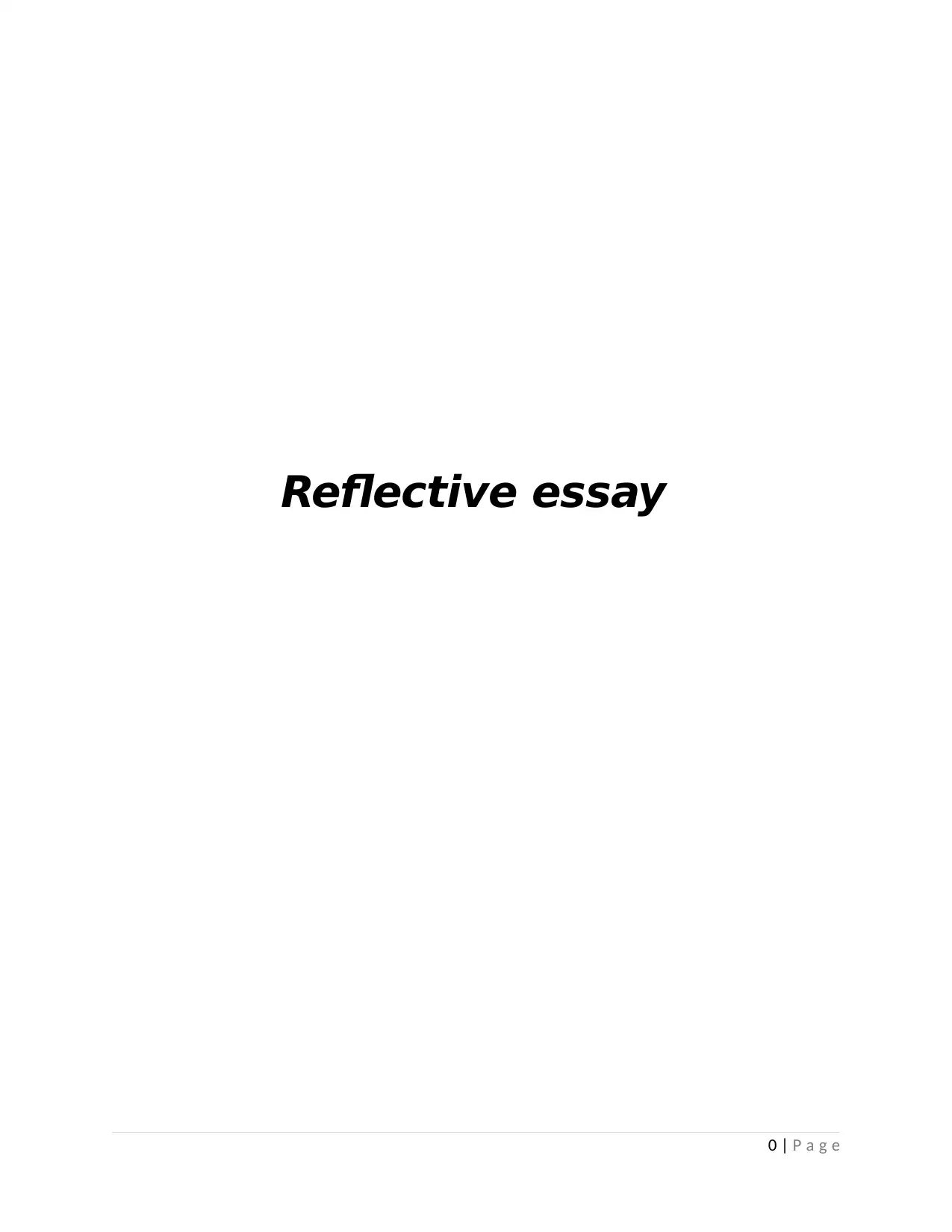
Reflective essay
0 | P a g e
0 | P a g e
Paraphrase This Document
Need a fresh take? Get an instant paraphrase of this document with our AI Paraphraser
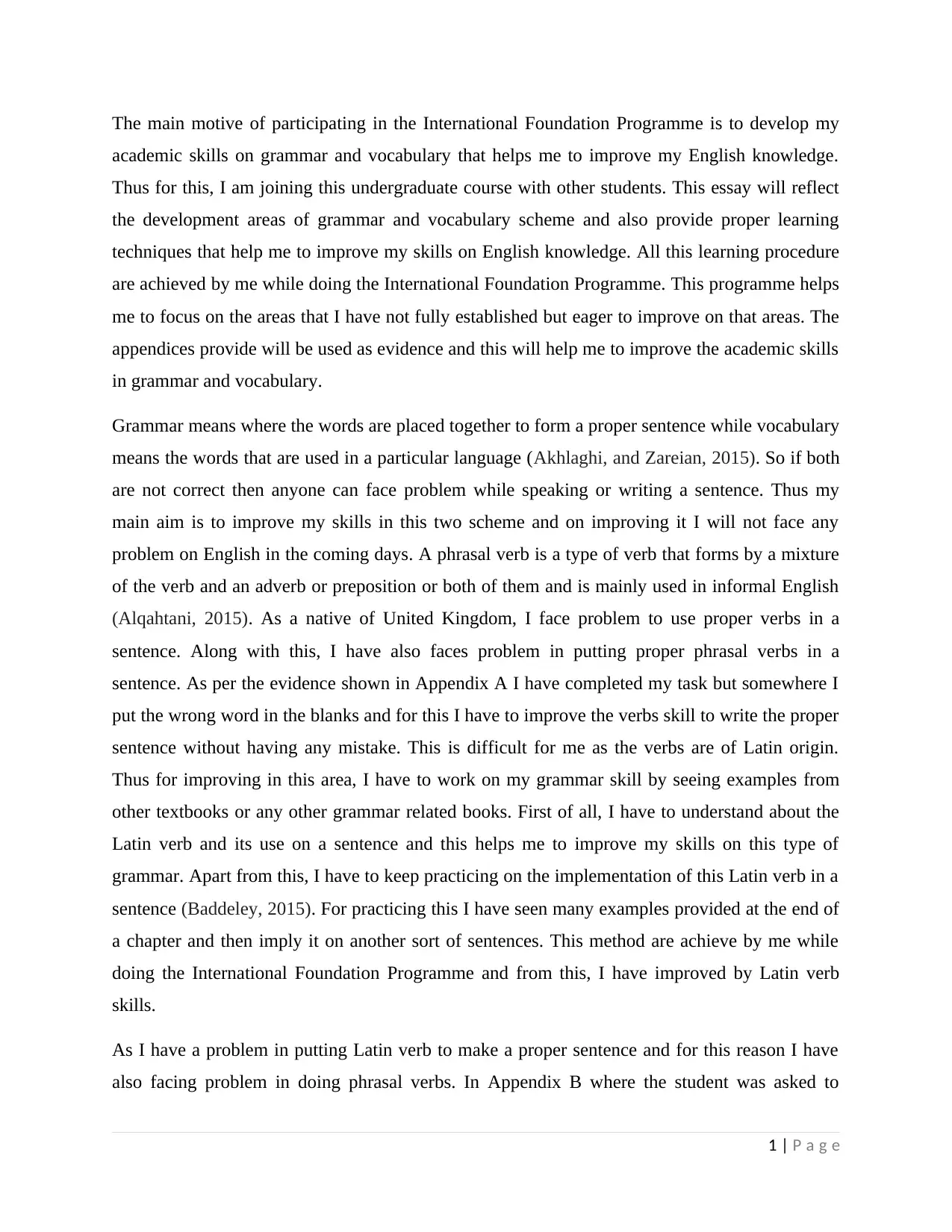
The main motive of participating in the International Foundation Programme is to develop my
academic skills on grammar and vocabulary that helps me to improve my English knowledge.
Thus for this, I am joining this undergraduate course with other students. This essay will reflect
the development areas of grammar and vocabulary scheme and also provide proper learning
techniques that help me to improve my skills on English knowledge. All this learning procedure
are achieved by me while doing the International Foundation Programme. This programme helps
me to focus on the areas that I have not fully established but eager to improve on that areas. The
appendices provide will be used as evidence and this will help me to improve the academic skills
in grammar and vocabulary.
Grammar means where the words are placed together to form a proper sentence while vocabulary
means the words that are used in a particular language (Akhlaghi, and Zareian, 2015). So if both
are not correct then anyone can face problem while speaking or writing a sentence. Thus my
main aim is to improve my skills in this two scheme and on improving it I will not face any
problem on English in the coming days. A phrasal verb is a type of verb that forms by a mixture
of the verb and an adverb or preposition or both of them and is mainly used in informal English
(Alqahtani, 2015). As a native of United Kingdom, I face problem to use proper verbs in a
sentence. Along with this, I have also faces problem in putting proper phrasal verbs in a
sentence. As per the evidence shown in Appendix A I have completed my task but somewhere I
put the wrong word in the blanks and for this I have to improve the verbs skill to write the proper
sentence without having any mistake. This is difficult for me as the verbs are of Latin origin.
Thus for improving in this area, I have to work on my grammar skill by seeing examples from
other textbooks or any other grammar related books. First of all, I have to understand about the
Latin verb and its use on a sentence and this helps me to improve my skills on this type of
grammar. Apart from this, I have to keep practicing on the implementation of this Latin verb in a
sentence (Baddeley, 2015). For practicing this I have seen many examples provided at the end of
a chapter and then imply it on another sort of sentences. This method are achieve by me while
doing the International Foundation Programme and from this, I have improved by Latin verb
skills.
As I have a problem in putting Latin verb to make a proper sentence and for this reason I have
also facing problem in doing phrasal verbs. In Appendix B where the student was asked to
1 | P a g e
academic skills on grammar and vocabulary that helps me to improve my English knowledge.
Thus for this, I am joining this undergraduate course with other students. This essay will reflect
the development areas of grammar and vocabulary scheme and also provide proper learning
techniques that help me to improve my skills on English knowledge. All this learning procedure
are achieved by me while doing the International Foundation Programme. This programme helps
me to focus on the areas that I have not fully established but eager to improve on that areas. The
appendices provide will be used as evidence and this will help me to improve the academic skills
in grammar and vocabulary.
Grammar means where the words are placed together to form a proper sentence while vocabulary
means the words that are used in a particular language (Akhlaghi, and Zareian, 2015). So if both
are not correct then anyone can face problem while speaking or writing a sentence. Thus my
main aim is to improve my skills in this two scheme and on improving it I will not face any
problem on English in the coming days. A phrasal verb is a type of verb that forms by a mixture
of the verb and an adverb or preposition or both of them and is mainly used in informal English
(Alqahtani, 2015). As a native of United Kingdom, I face problem to use proper verbs in a
sentence. Along with this, I have also faces problem in putting proper phrasal verbs in a
sentence. As per the evidence shown in Appendix A I have completed my task but somewhere I
put the wrong word in the blanks and for this I have to improve the verbs skill to write the proper
sentence without having any mistake. This is difficult for me as the verbs are of Latin origin.
Thus for improving in this area, I have to work on my grammar skill by seeing examples from
other textbooks or any other grammar related books. First of all, I have to understand about the
Latin verb and its use on a sentence and this helps me to improve my skills on this type of
grammar. Apart from this, I have to keep practicing on the implementation of this Latin verb in a
sentence (Baddeley, 2015). For practicing this I have seen many examples provided at the end of
a chapter and then imply it on another sort of sentences. This method are achieve by me while
doing the International Foundation Programme and from this, I have improved by Latin verb
skills.
As I have a problem in putting Latin verb to make a proper sentence and for this reason I have
also facing problem in doing phrasal verbs. In Appendix B where the student was asked to
1 | P a g e
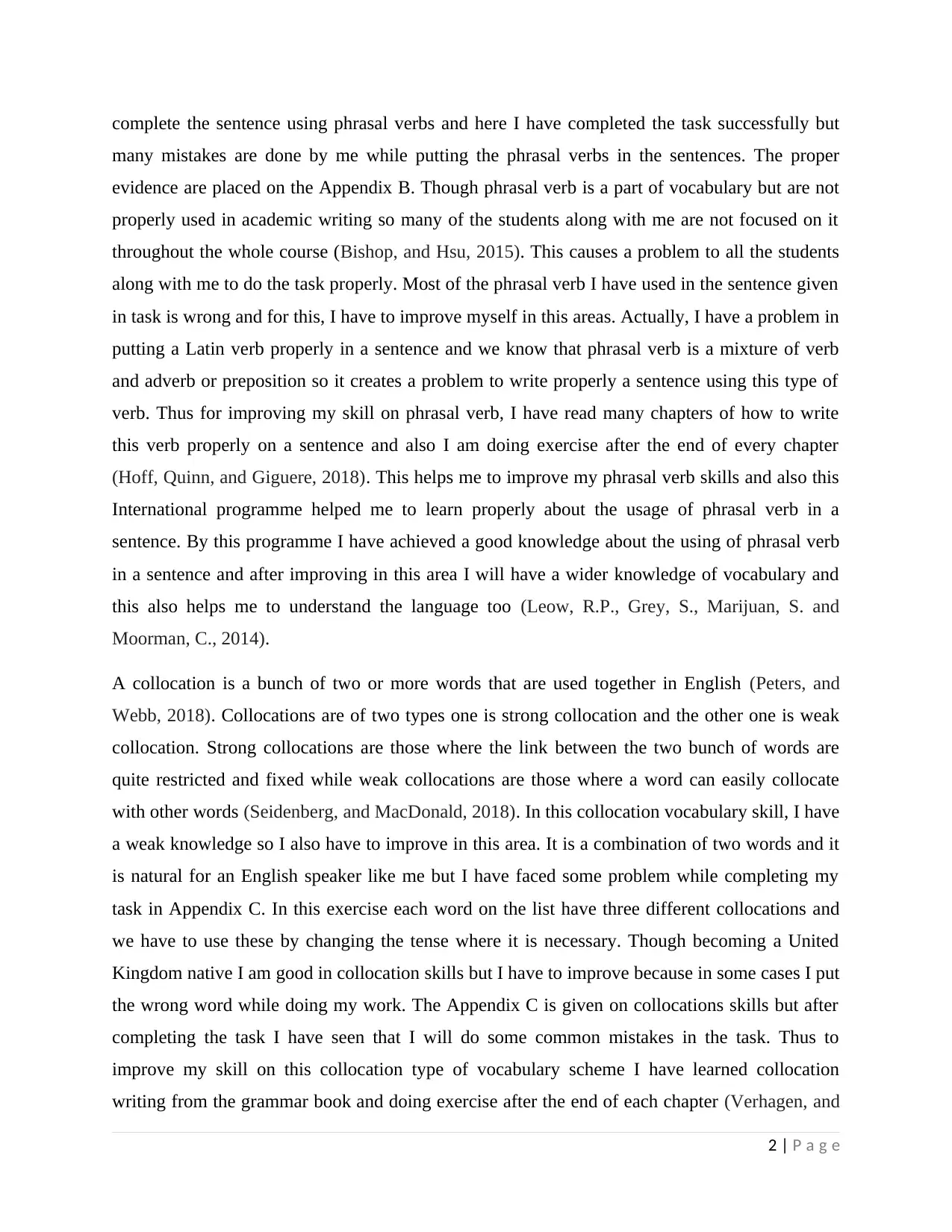
complete the sentence using phrasal verbs and here I have completed the task successfully but
many mistakes are done by me while putting the phrasal verbs in the sentences. The proper
evidence are placed on the Appendix B. Though phrasal verb is a part of vocabulary but are not
properly used in academic writing so many of the students along with me are not focused on it
throughout the whole course (Bishop, and Hsu, 2015). This causes a problem to all the students
along with me to do the task properly. Most of the phrasal verb I have used in the sentence given
in task is wrong and for this, I have to improve myself in this areas. Actually, I have a problem in
putting a Latin verb properly in a sentence and we know that phrasal verb is a mixture of verb
and adverb or preposition so it creates a problem to write properly a sentence using this type of
verb. Thus for improving my skill on phrasal verb, I have read many chapters of how to write
this verb properly on a sentence and also I am doing exercise after the end of every chapter
(Hoff, Quinn, and Giguere, 2018). This helps me to improve my phrasal verb skills and also this
International programme helped me to learn properly about the usage of phrasal verb in a
sentence. By this programme I have achieved a good knowledge about the using of phrasal verb
in a sentence and after improving in this area I will have a wider knowledge of vocabulary and
this also helps me to understand the language too (Leow, R.P., Grey, S., Marijuan, S. and
Moorman, C., 2014).
A collocation is a bunch of two or more words that are used together in English (Peters, and
Webb, 2018). Collocations are of two types one is strong collocation and the other one is weak
collocation. Strong collocations are those where the link between the two bunch of words are
quite restricted and fixed while weak collocations are those where a word can easily collocate
with other words (Seidenberg, and MacDonald, 2018). In this collocation vocabulary skill, I have
a weak knowledge so I also have to improve in this area. It is a combination of two words and it
is natural for an English speaker like me but I have faced some problem while completing my
task in Appendix C. In this exercise each word on the list have three different collocations and
we have to use these by changing the tense where it is necessary. Though becoming a United
Kingdom native I am good in collocation skills but I have to improve because in some cases I put
the wrong word while doing my work. The Appendix C is given on collocations skills but after
completing the task I have seen that I will do some common mistakes in the task. Thus to
improve my skill on this collocation type of vocabulary scheme I have learned collocation
writing from the grammar book and doing exercise after the end of each chapter (Verhagen, and
2 | P a g e
many mistakes are done by me while putting the phrasal verbs in the sentences. The proper
evidence are placed on the Appendix B. Though phrasal verb is a part of vocabulary but are not
properly used in academic writing so many of the students along with me are not focused on it
throughout the whole course (Bishop, and Hsu, 2015). This causes a problem to all the students
along with me to do the task properly. Most of the phrasal verb I have used in the sentence given
in task is wrong and for this, I have to improve myself in this areas. Actually, I have a problem in
putting a Latin verb properly in a sentence and we know that phrasal verb is a mixture of verb
and adverb or preposition so it creates a problem to write properly a sentence using this type of
verb. Thus for improving my skill on phrasal verb, I have read many chapters of how to write
this verb properly on a sentence and also I am doing exercise after the end of every chapter
(Hoff, Quinn, and Giguere, 2018). This helps me to improve my phrasal verb skills and also this
International programme helped me to learn properly about the usage of phrasal verb in a
sentence. By this programme I have achieved a good knowledge about the using of phrasal verb
in a sentence and after improving in this area I will have a wider knowledge of vocabulary and
this also helps me to understand the language too (Leow, R.P., Grey, S., Marijuan, S. and
Moorman, C., 2014).
A collocation is a bunch of two or more words that are used together in English (Peters, and
Webb, 2018). Collocations are of two types one is strong collocation and the other one is weak
collocation. Strong collocations are those where the link between the two bunch of words are
quite restricted and fixed while weak collocations are those where a word can easily collocate
with other words (Seidenberg, and MacDonald, 2018). In this collocation vocabulary skill, I have
a weak knowledge so I also have to improve in this area. It is a combination of two words and it
is natural for an English speaker like me but I have faced some problem while completing my
task in Appendix C. In this exercise each word on the list have three different collocations and
we have to use these by changing the tense where it is necessary. Though becoming a United
Kingdom native I am good in collocation skills but I have to improve because in some cases I put
the wrong word while doing my work. The Appendix C is given on collocations skills but after
completing the task I have seen that I will do some common mistakes in the task. Thus to
improve my skill on this collocation type of vocabulary scheme I have learned collocation
writing from the grammar book and doing exercise after the end of each chapter (Verhagen, and
2 | P a g e
⊘ This is a preview!⊘
Do you want full access?
Subscribe today to unlock all pages.

Trusted by 1+ million students worldwide
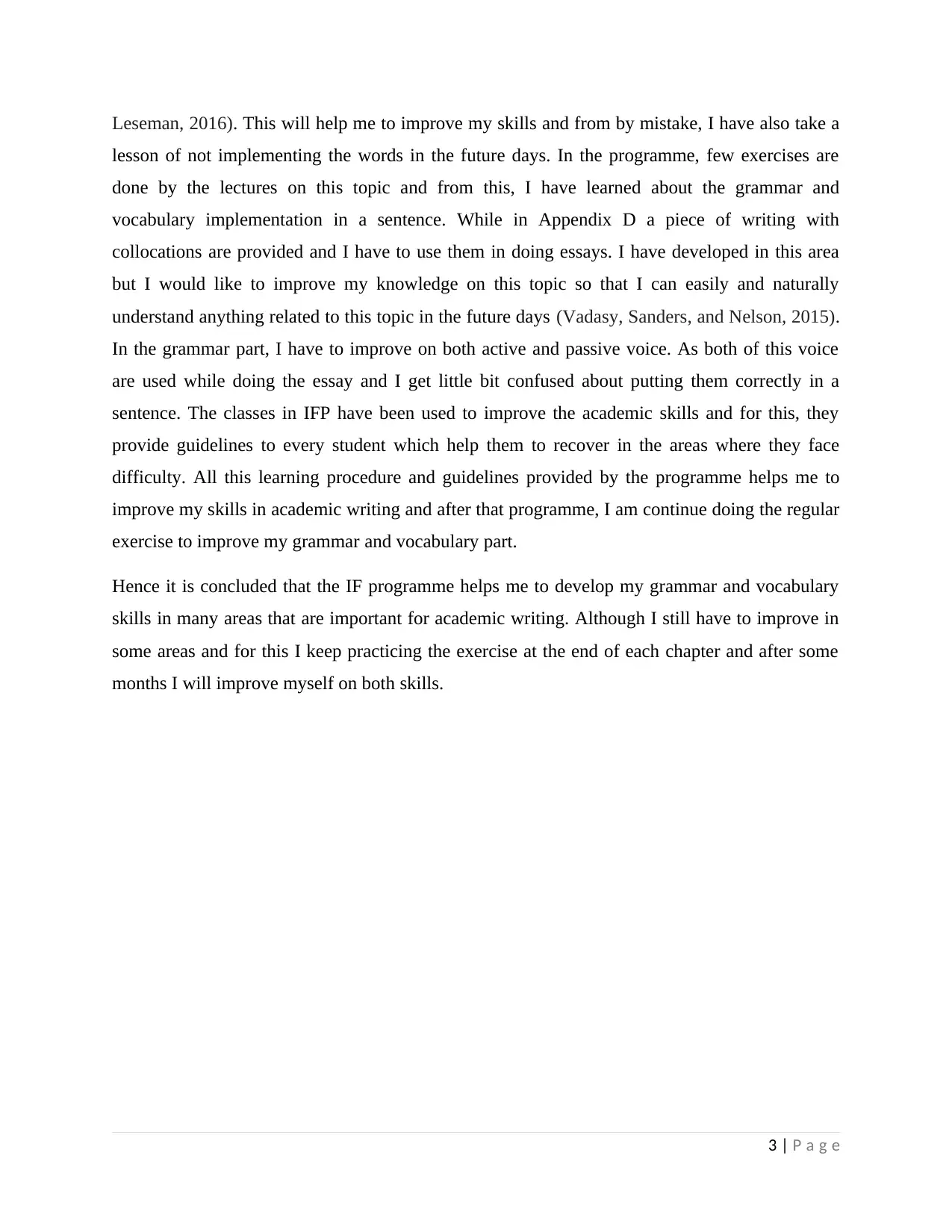
Leseman, 2016). This will help me to improve my skills and from by mistake, I have also take a
lesson of not implementing the words in the future days. In the programme, few exercises are
done by the lectures on this topic and from this, I have learned about the grammar and
vocabulary implementation in a sentence. While in Appendix D a piece of writing with
collocations are provided and I have to use them in doing essays. I have developed in this area
but I would like to improve my knowledge on this topic so that I can easily and naturally
understand anything related to this topic in the future days (Vadasy, Sanders, and Nelson, 2015).
In the grammar part, I have to improve on both active and passive voice. As both of this voice
are used while doing the essay and I get little bit confused about putting them correctly in a
sentence. The classes in IFP have been used to improve the academic skills and for this, they
provide guidelines to every student which help them to recover in the areas where they face
difficulty. All this learning procedure and guidelines provided by the programme helps me to
improve my skills in academic writing and after that programme, I am continue doing the regular
exercise to improve my grammar and vocabulary part.
Hence it is concluded that the IF programme helps me to develop my grammar and vocabulary
skills in many areas that are important for academic writing. Although I still have to improve in
some areas and for this I keep practicing the exercise at the end of each chapter and after some
months I will improve myself on both skills.
3 | P a g e
lesson of not implementing the words in the future days. In the programme, few exercises are
done by the lectures on this topic and from this, I have learned about the grammar and
vocabulary implementation in a sentence. While in Appendix D a piece of writing with
collocations are provided and I have to use them in doing essays. I have developed in this area
but I would like to improve my knowledge on this topic so that I can easily and naturally
understand anything related to this topic in the future days (Vadasy, Sanders, and Nelson, 2015).
In the grammar part, I have to improve on both active and passive voice. As both of this voice
are used while doing the essay and I get little bit confused about putting them correctly in a
sentence. The classes in IFP have been used to improve the academic skills and for this, they
provide guidelines to every student which help them to recover in the areas where they face
difficulty. All this learning procedure and guidelines provided by the programme helps me to
improve my skills in academic writing and after that programme, I am continue doing the regular
exercise to improve my grammar and vocabulary part.
Hence it is concluded that the IF programme helps me to develop my grammar and vocabulary
skills in many areas that are important for academic writing. Although I still have to improve in
some areas and for this I keep practicing the exercise at the end of each chapter and after some
months I will improve myself on both skills.
3 | P a g e
Paraphrase This Document
Need a fresh take? Get an instant paraphrase of this document with our AI Paraphraser
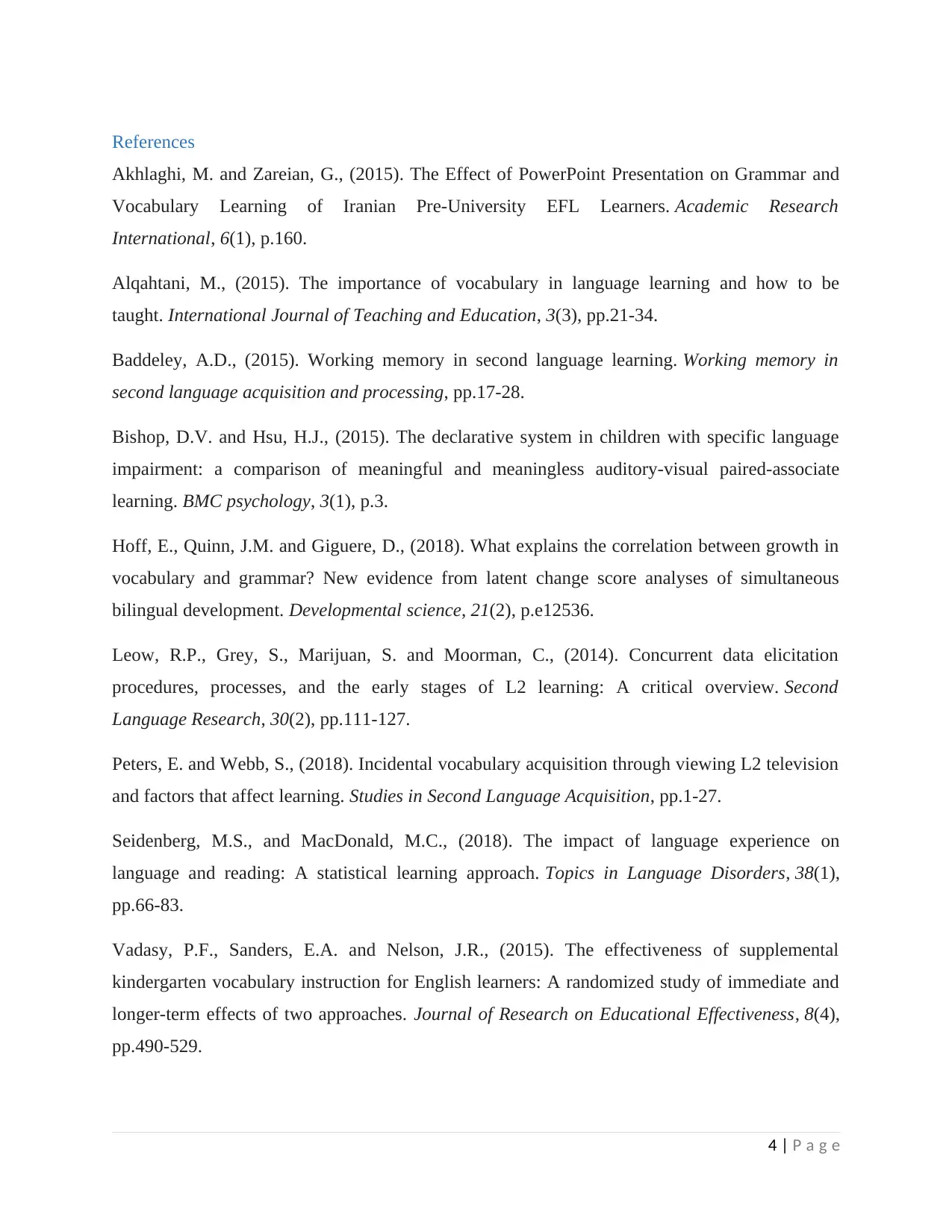
References
Akhlaghi, M. and Zareian, G., (2015). The Effect of PowerPoint Presentation on Grammar and
Vocabulary Learning of Iranian Pre-University EFL Learners. Academic Research
International, 6(1), p.160.
Alqahtani, M., (2015). The importance of vocabulary in language learning and how to be
taught. International Journal of Teaching and Education, 3(3), pp.21-34.
Baddeley, A.D., (2015). Working memory in second language learning. Working memory in
second language acquisition and processing, pp.17-28.
Bishop, D.V. and Hsu, H.J., (2015). The declarative system in children with specific language
impairment: a comparison of meaningful and meaningless auditory-visual paired-associate
learning. BMC psychology, 3(1), p.3.
Hoff, E., Quinn, J.M. and Giguere, D., (2018). What explains the correlation between growth in
vocabulary and grammar? New evidence from latent change score analyses of simultaneous
bilingual development. Developmental science, 21(2), p.e12536.
Leow, R.P., Grey, S., Marijuan, S. and Moorman, C., (2014). Concurrent data elicitation
procedures, processes, and the early stages of L2 learning: A critical overview. Second
Language Research, 30(2), pp.111-127.
Peters, E. and Webb, S., (2018). Incidental vocabulary acquisition through viewing L2 television
and factors that affect learning. Studies in Second Language Acquisition, pp.1-27.
Seidenberg, M.S., and MacDonald, M.C., (2018). The impact of language experience on
language and reading: A statistical learning approach. Topics in Language Disorders, 38(1),
pp.66-83.
Vadasy, P.F., Sanders, E.A. and Nelson, J.R., (2015). The effectiveness of supplemental
kindergarten vocabulary instruction for English learners: A randomized study of immediate and
longer-term effects of two approaches. Journal of Research on Educational Effectiveness, 8(4),
pp.490-529.
4 | P a g e
Akhlaghi, M. and Zareian, G., (2015). The Effect of PowerPoint Presentation on Grammar and
Vocabulary Learning of Iranian Pre-University EFL Learners. Academic Research
International, 6(1), p.160.
Alqahtani, M., (2015). The importance of vocabulary in language learning and how to be
taught. International Journal of Teaching and Education, 3(3), pp.21-34.
Baddeley, A.D., (2015). Working memory in second language learning. Working memory in
second language acquisition and processing, pp.17-28.
Bishop, D.V. and Hsu, H.J., (2015). The declarative system in children with specific language
impairment: a comparison of meaningful and meaningless auditory-visual paired-associate
learning. BMC psychology, 3(1), p.3.
Hoff, E., Quinn, J.M. and Giguere, D., (2018). What explains the correlation between growth in
vocabulary and grammar? New evidence from latent change score analyses of simultaneous
bilingual development. Developmental science, 21(2), p.e12536.
Leow, R.P., Grey, S., Marijuan, S. and Moorman, C., (2014). Concurrent data elicitation
procedures, processes, and the early stages of L2 learning: A critical overview. Second
Language Research, 30(2), pp.111-127.
Peters, E. and Webb, S., (2018). Incidental vocabulary acquisition through viewing L2 television
and factors that affect learning. Studies in Second Language Acquisition, pp.1-27.
Seidenberg, M.S., and MacDonald, M.C., (2018). The impact of language experience on
language and reading: A statistical learning approach. Topics in Language Disorders, 38(1),
pp.66-83.
Vadasy, P.F., Sanders, E.A. and Nelson, J.R., (2015). The effectiveness of supplemental
kindergarten vocabulary instruction for English learners: A randomized study of immediate and
longer-term effects of two approaches. Journal of Research on Educational Effectiveness, 8(4),
pp.490-529.
4 | P a g e
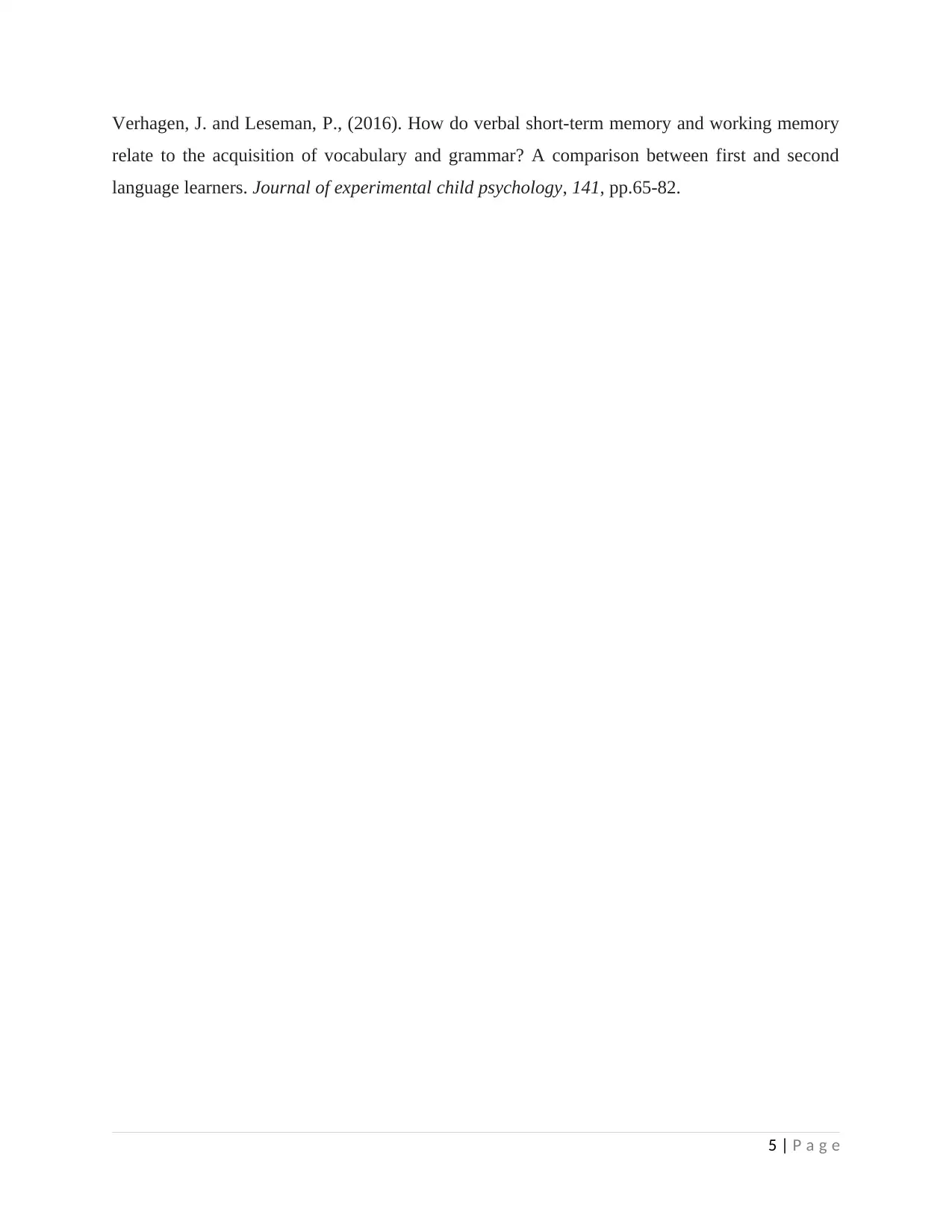
Verhagen, J. and Leseman, P., (2016). How do verbal short-term memory and working memory
relate to the acquisition of vocabulary and grammar? A comparison between first and second
language learners. Journal of experimental child psychology, 141, pp.65-82.
5 | P a g e
relate to the acquisition of vocabulary and grammar? A comparison between first and second
language learners. Journal of experimental child psychology, 141, pp.65-82.
5 | P a g e
⊘ This is a preview!⊘
Do you want full access?
Subscribe today to unlock all pages.

Trusted by 1+ million students worldwide
1 out of 6
Related Documents
Your All-in-One AI-Powered Toolkit for Academic Success.
+13062052269
info@desklib.com
Available 24*7 on WhatsApp / Email
![[object Object]](/_next/static/media/star-bottom.7253800d.svg)
Unlock your academic potential
Copyright © 2020–2026 A2Z Services. All Rights Reserved. Developed and managed by ZUCOL.





